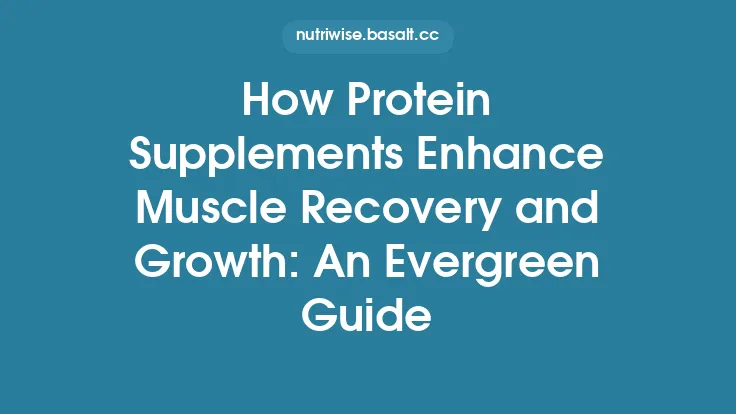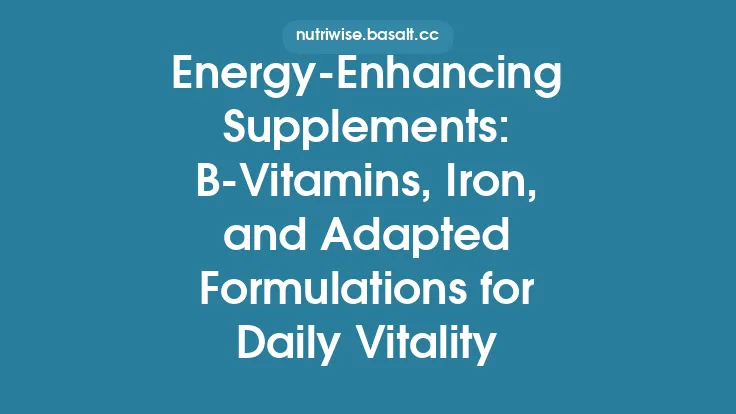Adjusting to life with a newborn is a whirlwind of joy, sleepless nights, and constant physical and mental demands. While a balanced diet and good sleep hygiene are the foundations of recovery, many new parents find that targeted supplementation can help bridge nutritional gaps, sustain energy levels, and support the body’s natural repair processes. This guide walks you through the most evidence‑backed supplements for new parents, explains how they work, and offers practical tips for incorporating them into a hectic daily routine.
Understanding the Unique Nutritional Demands of New Parenthood
Energy Depletion and Recovery Needs
- Sleep disruption: Fragmented sleep reduces glycogen stores and impairs glucose regulation, leading to early‑day fatigue.
- Increased physical activity: Carrying, lifting, and soothing a baby taxes core muscles and joints, accelerating muscle protein turnover.
- Hormonal shifts: Even after the postpartum period, cortisol and catecholamine levels can remain elevated, influencing metabolism and immune function.
Why Supplements Can Be Helpful
- Nutrient density: Whole‑food meals may be rushed or limited in variety, making it harder to meet micronutrient needs.
- Targeted support: Certain nutrients (e.g., magnesium, B‑vitamins) play direct roles in energy production and muscle recovery.
- Convenient dosing: Capsules, powders, or sublingual tablets can be taken quickly between feedings or diaper changes.
Core Supplements for Energy Production
B‑Complex Vitamins
- What they do: B‑vitamins (B1, B2, B3, B5, B6, B7, B9, B12) act as co‑enzymes in the Krebs cycle, converting carbohydrates, fats, and proteins into ATP—the body’s energy currency.
- Key forms:
- Methylcobalamin (B12) and 5‑methyltetrahydrofolate (B9) for optimal bioavailability.
- Pyridoxal‑5‑phosphate (B6) for neurotransmitter synthesis, supporting mood stability.
- Dosage tip: A high‑quality B‑complex delivering 100–200 % of the Daily Value (DV) for each B‑vitamin is generally safe. Take with breakfast to align with carbohydrate intake.
Coenzyme Q10 (Ubiquinol)
- Mechanism: Ubiquinol is the reduced, active form of CoQ10 and participates directly in mitochondrial electron transport, enhancing ATP generation.
- Evidence: Studies show modest improvements in perceived energy and reduced fatigue in adults with low baseline levels.
- Suggested intake: 100–200 mg per day, preferably with a fat‑containing meal to improve absorption.
Iron (for non‑lactating mothers and fathers)
- Why it matters: Iron is essential for hemoglobin synthesis and oxygen transport; even mild deficiency can cause fatigue.
- Screening first: Have a ferritin test before supplementing, as excess iron can be harmful.
- Form: Ferrous bisglycinate or iron polymaltose are gentler on the stomach.
- Typical dose: 18 mg elemental iron (the RDA for adult women) taken with vitamin C to boost absorption, preferably separate from calcium‑rich foods.
Supplements That Aid Physical Recovery
Magnesium (Magnesium Glycinate or Malate)
- Roles: Supports muscle relaxation, protein synthesis, and ATP stability. Also helps regulate sleep quality.
- Choosing the form: Glycinate is highly absorbable and less likely to cause diarrhea; malate may provide additional energy benefits.
- Dosage: 300–400 mg elemental magnesium in the evening, split into two doses if gastrointestinal tolerance is an issue.
Protein Powders (Whey, Pea, or Rice)
- Purpose: Supplies essential amino acids for muscle repair, especially important when meals are irregular.
- Timing: A 20‑gram serving within 30 minutes of a physically demanding activity (e.g., lifting a baby, cleaning) can stimulate muscle protein synthesis.
- Considerations: Choose a low‑sugar, minimal‑additive product. For dairy‑sensitive parents, plant‑based blends with a complete amino acid profile are effective.
Omega‑3 Fatty Acids (EPA/DHA)
- Benefits: Reduce inflammation, support joint health, and improve cognitive function—helpful for the mental stamina required in parenting.
- Source: High‑purity fish oil or algal oil (vegan) providing at least 500 mg combined EPA/DHA daily.
- Tips: Take with a meal containing fat to enhance absorption; consider enteric‑coated capsules to minimize fishy aftertaste.
Immune and Stress‑Management Supplements
Vitamin D3
- Why it’s critical: Low vitamin D is linked to fatigue, mood disturbances, and impaired immune response.
- Testing: Serum 25‑OH vitamin D levels guide dosing; many adults benefit from 1,000–2,000 IU daily, with higher doses (4,000 IU) for those with documented deficiency.
- Synergy: Pair with vitamin K2 (100 µg) to support calcium metabolism and cardiovascular health.
Probiotics
- Function: A balanced gut microbiome influences energy metabolism, mood, and immune resilience.
- Strains to look for: *Lactobacillus rhamnosus GG, Bifidobacterium lactis BB‑12, and Saccharomyces boulardii* have robust safety data for adults.
- Dosage: 5–10 billion CFU daily, taken with a meal to protect against stomach acid.
Adaptogenic Herbs (Ashwagandha, Rhodiola Rosea)
- Mechanism: Modulate the hypothalamic‑pituitary‑adrenal (HPA) axis, reducing cortisol spikes and improving perceived energy.
- Evidence: Clinical trials show reduced fatigue and better stress coping after 8–12 weeks of standardized extracts.
- Recommended forms:
- Ashwagandha (KSM‑66) – 300 mg twice daily.
- Rhodiola (standardized to 3 % rosavins, 1 % salidroside) – 200 mg in the morning.
Practical Strategies for Integrating Supplements Into a New‑Parent Lifestyle
- Batch‑Prep Doses: Use a pill organizer with compartments for morning, midday, and evening. Fill it once a week to avoid daily decision fatigue.
- Combine with Routine Activities: Pair supplement intake with unavoidable tasks—e.g., take B‑complex with your first cup of coffee, magnesium with bedtime brushing.
- Mindful Timing:
- Energy‑boosting supplements (B‑complex, CoQ10, Rhodiola) are best taken earlier in the day.
- Recovery‑focused supplements (magnesium, protein, omega‑3) can be taken later, especially if they aid sleep.
- Stay Hydrated: Adequate water intake improves the absorption of water‑soluble vitamins (B‑complex, vitamin C) and reduces the risk of constipation from iron or magnesium.
- Monitor and Adjust: Keep a simple log of energy levels, sleep quality, and any side effects. Reassess supplement choices after 4–6 weeks, and consult a healthcare professional if you notice persistent fatigue or adverse reactions.
Safety Considerations and Potential Interactions
| Supplement | Common Interactions | Precautions |
|---|---|---|
| Iron | Calcium, high‑dose zinc, certain antibiotics (e.g., tetracycline) | Test ferritin first; avoid if ferritin > 100 ng/mL |
| Magnesium | High‑dose calcium, certain heart medications (e.g., digoxin) | Split doses if diarrhea occurs |
| Vitamin D | High calcium intake, thiazide diuretics | Monitor serum 25‑OH levels if > 4,000 IU/day |
| Omega‑3 | Anticoagulants (warfarin) | Use moderate doses; discuss with physician if on blood thinners |
| Adaptogens | Sedatives, thyroid medication (ashwagandha) | Start with half the recommended dose to assess tolerance |
| Probiotics | Immunosuppressive therapy | Choose strains with documented safety; avoid if severely immunocompromised |
When to Seek Professional Guidance
- Persistent fatigue despite optimized sleep, nutrition, and supplementation.
- Signs of nutrient excess (e.g., tingling from high B‑vitamin intake, gastrointestinal distress from iron).
- Pre‑existing medical conditions such as thyroid disorders, cardiovascular disease, or chronic kidney disease.
- Medication regimens that could interact with supplements (e.g., anticoagulants, antacids, antidepressants).
A registered dietitian or primary‑care physician can order relevant labs (e.g., ferritin, vitamin D, magnesium) and tailor supplement dosages to your individual biochemistry.
Summary Checklist for New Parents
- Morning: B‑Complex + CoQ10 + Vitamin D (with breakfast)
- Midday: Omega‑3 + Probiotic (with lunch)
- Afternoon/Pre‑exercise: Adaptogen (ashwagandha or rhodiola) + Iron (if needed, with vitamin C)
- Evening: Magnesium + Protein shake (if protein needs aren’t met) + optional magnesium‑rich bedtime tea (e.g., chamomile)
By aligning supplement timing with daily rhythms and pairing them with nutrient‑dense meals, new parents can sustain higher energy levels, recover more efficiently from physical demands, and maintain a resilient immune system—all while navigating the beautiful chaos of early parenthood.





